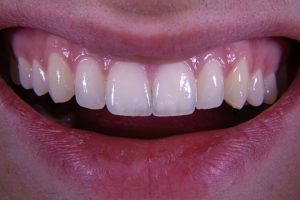According to the Academy of General Dentistry, roughly 45 million Americans experience tooth sensitivity. Individuals with teeth sensitivity usually experience a sharp pain when their teeth are exposed to hot, cold, or sugary substances. The majority of causes are food or drinks, however, some individuals experience pain by simply being in the cold weather. Some people have naturally sensitive teeth, while others have teeth that have become sensitive because of erosion or trauma.
Solutions for Teeth Sensitivity
1) Brush properly. Brushing too hard or too often can wear down enamel and cause teeth sensitivity. The ADA recommends using a soft-bristled brush and brushing in circular motions at a 45-degree angle. Electric toothbrushes can make proper brushing much easier.
2) Use a toothpaste for sensitive teeth. Fluoride is an effective desensitizer because it protects enamel. There is also toothpaste that contains ingredients which soothe and calm your nerve endings. Whitening and tartar control toothpaste is more abrasive and can actually make sensitivity worse.
3) Rinse and wait. Acidic foods, juices, and sodas can erode enamel. Rinse your mouth with water immediately after eating or drinking acidic food, and wait thirty minutes before brushing. Waiting thirty minutes before brushing gives the acid time to be neutralized so you avoid the double whammy of brushing your teeth with acid.
4) Use a straw. Drinking through a straw has two benefits. Using a straw will keep most of the pain-causing food away from your teeth, and it will also keep acidic and sugary food from wearing away enamel.
5) Wear a mouth guard. Clenching and grinding your teeth can lead to sensitivity. Your dentist can fit you with a night guard to protect your teeth while you sleep.
If none of these solutions works for you, you will need to be thoroughly evaluated. There are several dental procedures available to treat sensitivity.
Procedures to Treat Teeth Sensitivity
- Desensitizer. Your dentist can apply a desensitizing coating to your teeth. This is a dental office procedure which is often effective.
- Dental sealant. A dental sealant may be an effective sealant of exposed roots. By covering the root, the sealant reduces the sensitivity.
- Periodontal treatment. Many times, sensitivity is caused by receding gums exposing the unprotected tooth root. Receding gums are common as we age, and can be caused by gum disease. A periodontist (gum specialist) can recommend solutions to get your gums back in shape.
- A crown or root canal treatment. If an abscess is causing the sensitivity, root canal treatment is needed. If the sensitivity is due to an injured tooth, enamel erosion, or single exposed root, a crown may help. Crowns are also often needed after root canal treatment.
Brushing, flossing, and regular professional cleaning will keep your gums from receding and causing teeth sensitivity. Proper brushing techniques will help you keep your enamel intact. See your dentist at the first sign of sensitivity. Often beginning problems can be easily treated. If you wait to get treatment, you often end up with a bigger problem that is more difficult to treat. Many times sensitive teeth can be treated with a good cleaning and use of a special toothpaste.







